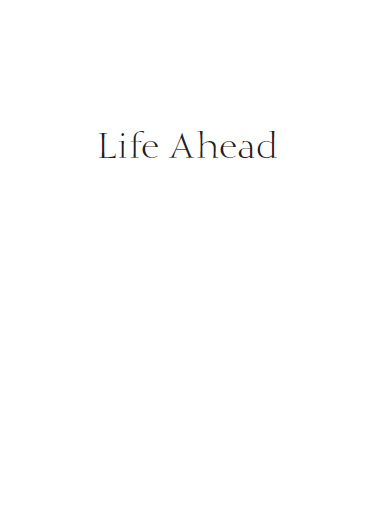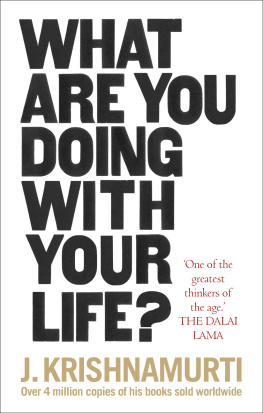Krishnamurti - Life Ahead
Here you can read online Krishnamurti - Life Ahead full text of the book (entire story) in english for free. Download pdf and epub, get meaning, cover and reviews about this ebook. publisher: New World Library, genre: Religion. Description of the work, (preface) as well as reviews are available. Best literature library LitArk.com created for fans of good reading and offers a wide selection of genres:
Romance novel
Science fiction
Adventure
Detective
Science
History
Home and family
Prose
Art
Politics
Computer
Non-fiction
Religion
Business
Children
Humor
Choose a favorite category and find really read worthwhile books. Enjoy immersion in the world of imagination, feel the emotions of the characters or learn something new for yourself, make an fascinating discovery.
- Book:Life Ahead
- Author:
- Publisher:New World Library
- Genre:
- Rating:3 / 5
- Favourites:Add to favourites
- Your mark:
- 60
- 1
- 2
- 3
- 4
- 5
Life Ahead: summary, description and annotation
We offer to read an annotation, description, summary or preface (depends on what the author of the book "Life Ahead" wrote himself). If you haven't found the necessary information about the book — write in the comments, we will try to find it.
Life Ahead — read online for free the complete book (whole text) full work
Below is the text of the book, divided by pages. System saving the place of the last page read, allows you to conveniently read the book "Life Ahead" online for free, without having to search again every time where you left off. Put a bookmark, and you can go to the page where you finished reading at any time.
Font size:
Interval:
Bookmark:

Other Titles by the Author
Education and the Significance of Life
The First and Last Freedom
Krishnamurtis Notebook
Think on These Things
The Book of Life
Total Freedom
Reflections on the Self
Freedom from the Known
The Awakening of Intelligence


Copyright 1963 by Krishnamurti Foundation of America
Krishnamurti Foundation of America, P.O. Box 1560, Ojai, California, 93024; website:
All rights reserved. This book may not be reproduced in whole or in part, stored in a retrieval system, or transmitted in any form or by any means electronic, mechanical, or other without written permission from the publisher, except by a reviewer, who may quote brief passages in a review.
Originally published in hardcover by Harper & Row in 1963.
Cover design by Mary Ann Casler
Interior design by Tona Pearce Myers
Library of Congress Cataloging-in-Publication Data
Krishnamurti, J. (Jiddu), 18951986.
Life ahead : on learning and the search for meaning / J. Krishnamurti.3rd pbk. ed.
p. cm.
Includes index.
ISBN-13: 978-1-57731-517-9 (pbk. : alk. paper)
1. Conduct of life. 2. Sociology. I. Title.
BJ1581.2.K75 2005
181'.4dc22 | 2005012961 |
First New World Library printing, September 2005
ISBN-13: 978-1-57731-517-9
ISBN-10: 1-57731-517-0
 Printed in Canada on 100% postconsumer waste recycled paper
Printed in Canada on 100% postconsumer waste recycled paper
 A proud member of the Green Press Initiative
A proud member of the Green Press Initiative
Distributed to the trade by Publishers Group West
10 9 8 7 6 5 4 3 2 1


I t seems to me that a totally different kind of morality and conduct, and an action that springs from the understanding of the whole process of living, have become an urgent necessity in our world of mounting crises and problems. We try to deal with these issues through political and organizational methods, through economic readjustment and various reforms; but none of these things will ever resolve the complex difficulties of human existence, though they may offer temporary relief. All reforms, however extensive and seemingly lasting, are in themselves merely productive of further confusion and further need of reformation. Without understanding the whole complex being of man, mere reformation will bring about only the confusing demand for further reforms. There is no end to reform; and there is no fundamental solution along these lines.
Political, economic, or social revolutions are not the answer either, for they have produced appalling tyrannies, or the mere transfer of power and authority into the hands of a different group. Such revolutions are not at any time the way out of our confusion and conflict.
But there is a revolution which is entirely different and which must take place if we are to emerge from the endless series of anxieties, conflicts, and frustrations in which we are caught. This revolution has to begin, not with theory and ideation, which eventually prove worthless, but with a radical transformation in the mind itself. Such a transformation can be brought about only through right education and the total development of the human being. It is a revolution that must take place in the whole of the mind and not merely in thought. Thought, after all, is only a result and not the source. There must be radical transformation in the source and not mere modification of the result. At present we are tinkering with results, with symptoms. We are not bringing about a vital change, uprooting the old ways of thought, freeing the mind from traditions and habits. It is with this vital change we are concerned and only right education can bring it into being.
To inquire and to learn is the function of the mind. By learning I do not mean the mere cultivation of memory or the accumulation of knowledge, but the capacity to think clearly and sanely without illusion, to start from facts and not from beliefs and ideals. There is no learning if thought originates from conclusions. Merely to acquire information or knowledge is not to learn. Learning implies the love of understanding and the love of doing a thing for itself. Learning is possible only when there is no coercion of any kind. And coercion takes many forms, does it not? There is coercion through influence, through attachment or threat, through persuasive encouragement or subtle forms of reward.
Most people think that learning is encouraged through comparison, whereas the contrary is the fact. Comparison brings about frustration and merely encourages envy, which is called competition. Like other forms of persuasion, comparison prevents learning and breeds fear. Ambition also breeds fear. Ambition, whether personal or identified with the collective, is always antisocial. So-called noble ambition in relationship is fundamentally destructive.
It is necessary to encourage the development of a good minda mind which is capable of dealing with the many issues of life as a whole, and which does not try to escape from them and so become self-contradictory, frustrated, bitter or cynical. And it is essential for the mind to be aware of its own conditioning, its own motives and pursuits.
Since the development of a good mind is one of our chief concerns, how one teaches becomes very important. There must be a cultivation of the totality of the mind, and not merely the giving of information. In the process of imparting knowledge, the educator has to invite discussion and encourage the students to inquire and to think independently.
Authority, as the one who knows, has no place in learning. The educator and the student are both learning through their special relationship with each other; but this does not mean that the educator disregards the orderliness of thought. Orderliness of thought is not brought about by discipline in the form of assertive statements of knowledge; but it comes into being naturally when the educator understands that in cultivating intelligence there must be a sense of freedom. This does not mean freedom to do whatever one likes, or to think in the spirit of mere contradiction. It is the freedom in which the student is being helped to be aware of his own urges and motives, which are revealed to him through his daily thought and action.
A disciplined mind is never a free mind; nor can a mind that has suppressed desire ever be free. It is only through understanding the whole process of desire that the mind can be free. Discipline always limits the mind to a movement within the framework of a particular system of thought or belief, does it not? And such a mind is never free to be intelligent. Discipline brings about submission to authority. It gives the capacity to function within the pattern of a society which demands functional ability, but it does not awaken the intelligence which has its own capacity. The mind that has cultivated nothing but capacity through memory is like the modern electronic computer which, though it functions with astonishing ability and accuracy, is still only a machine. Authority can persuade the mind to think in a particular direction. But being guided to think along certain lines, or in terms of a foregone conclusion, is not to think at all; it is merely to function like a human machine, which breeds thoughtless discontent, bringing with it frustration and other miseries.
Next pageFont size:
Interval:
Bookmark:
Similar books «Life Ahead»
Look at similar books to Life Ahead. We have selected literature similar in name and meaning in the hope of providing readers with more options to find new, interesting, not yet read works.
Discussion, reviews of the book Life Ahead and just readers' own opinions. Leave your comments, write what you think about the work, its meaning or the main characters. Specify what exactly you liked and what you didn't like, and why you think so.










